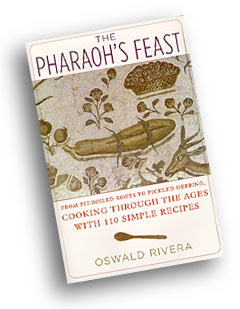
My second cookbook, The Pharaoh’s Feast (Avalon Books), had a simple premise: how cooking had evolved throughout recorded history. It featured 100 simple recipes, from the biblical mess of pottage (or lentil soup) noted in the first book of Moses, to the fusion cooking style of today. The book was also published in England under the title, Feasting with the Ancestors Sutton Publishing).
The book was a labor of love that combined two of my favorite topics, history and cooking. What I sought to do was recreate some of food history’s highlights detailing the cooking styles of their era. What was it like to have a meal in ancient Egypt, or Classical Greece or the Manchu Dynasty in China, or the caliphate in the Arab world? For that matter, what was it that people cooked and ate in the depressing times of the Middle Ages? You would be surprised to learn.
Food and meals have influenced our history in extraordinary ways. For instance, ever wondered what Cleopatra served Mark Antony on that barge on the Nile River that got him so overwhelmed that he immediately threw in his lot with her against his own native Rome? I’m sure there were some snails involved since, at the time, they were considered an aphrodisiac. And what did Jesus Christ and his disciples have on that famous last supper? Which was in reality a Passover Seder that he and his followers, being good devout Jews, were commemorating. And how did pizza get invented? That’s a story in itself. But some claim that it originated in Ancient Judea in the first century of the Common Era when the Roman 10th legion was stationed there. Figure that one out. That is tale for another time that I will explore comprehensively in a future posting.
To give you a taste of what I mean, below is recipe hailing from the time of Imperial Rome.
The Romans, as my fellows back on the block would say today, are a trip. They’re a contradiction. They ruled an empire stretching from the sands of Arabia to the moors of Scotland. They gave the world a system of laws, and an excellence in art, literature and architecture. But they were also bastards when they felt it was needed. The same society that gave us the works of Tacitus, Cicero and Virgil, also gave us spectacles of mass slaughter in the Coliseum where thousands were killed in gladiatorial contests or innocent victims ravaged by beasts, and all for the enjoyment of the populace (read that: mob). As the scholar-statesman Abba Eban once noted: The Romans believed in peace with a vengeance.
This contradiction is also reflected in their cooking. During the first centuries of the Roman Republic the diet was quite plain. This mainly consisted of wheat, olive, pork and fish; and, of course, wine, which was the main libation. Once Rome became an empire, all this changed. New tastes and new foodstuffs altered the social environment, at least for the upper crust. Some of the food became extremely exotic, and weird. Picture such things as dormice seasoned with honey, peacock’s brain boiled in its own feathers, sow’s womb stuffed with sea-unchins—you get the idea. Yes, you could say this was an example of profligacy and vice on the part of Roman society. But I’m sure not all Romans ate like this. You certainly wouldn’t if you belonged to what was termed, the “lower orders.”
The recipe given shows that even Romans could adhere to simplicity in their cooking. This recipe is credited to Apicius, and his work, On Cookery , or De Re Coquinaria. Apicius is a character. Although the recipe is simple, he was not. He was a patrician accustomed to a high standard of living, and is said to have poisoned himself when he discovered he had only a mere ten million sesterces left in the bank. Figure that ten million sesterces is equivalent to just under three-quarters of a ton of gold bullion. Apicius felt that such a paltry sum was not enough for a man of his infinite tastes.
By today’s standard’s, some his recipes are off the wall. I doubt many would enjoy cooking parrots, jellyfish, porpoises, and lark’s tongues But this one is just right. Easy, tasty, and good as a an appetizer.
ARTICHOKES, OIL, AND MINCED EGGS
16 artichoke hearts (canned are okay)
4 eggs, hard boiled and finely chopped
1/3 cup olive oil (preferably extra-virgin)
1/3 cup nuoc man fish sauce*
1. Wash the artichoke hearts under cold running water and pat dry with paper towels. Arrange the artichoke hearts on a serving platter.
2. Sprinkle chopped eggs atop the artichokes.
3. Drizzle with olive oil and fish sauce.
Yield: 4 servings.
note: nouc man fish sauce can be found in any store selling Thai, Korean, or Chinese products, or any Asian market.
Update: on my last posting, the recipe was for plantains. If you enjoy Caribbean cooking, check it out (I haven’t deleted that posting yet).
So, as they use to say on the Bob and Ray show (old timers will know what I’m talking about), “Until next time, hang by your thumbs and write if you get work.”
![Reblog this post [with Zemanta]](https://img.zemanta.com/reblog_e.png?x-id=0c3be4c3-fd59-4082-b2be-0cefd3828553)
